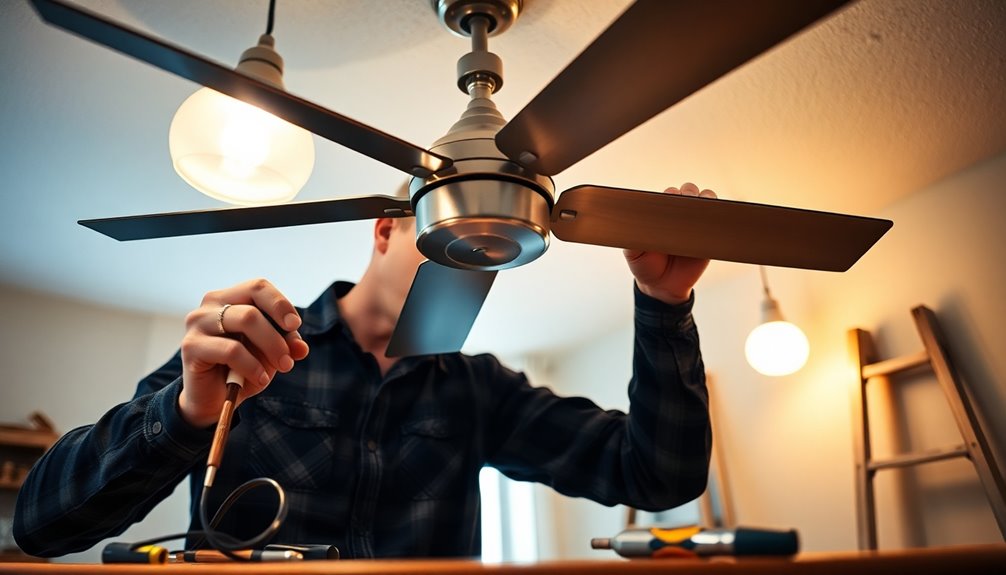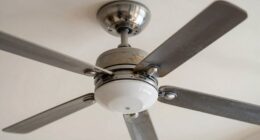If your ceiling fan hums, it's likely due to a few common issues. Loose wire connections can create unwanted sounds, while poorly lubricated motors cause friction, leading to that annoying hum. Sometimes, improperly installed dimmer switches contribute to buzzing, especially at lower speeds. You might also find that loose screws or imbalanced blades worsen the problem. Regular checks, tightening, and lubrication can help quiet things down. If the noise persists despite your efforts, there are deeper issues to reflect upon. Discovering more about these would help you tackle the problem effectively.
Key Takeaways
- Loose wire connections can cause humming sounds and vibrations in ceiling fans.
- Poorly lubricated motors lead to increased friction, resulting in humming noises.
- Incorrectly installed dimmer switches may trigger humming, especially at lower speeds.
- Imbalanced fan blades create excessive vibration, contributing to persistent humming.
- Regular maintenance and inspections can prevent and reduce humming issues in ceiling fans.
Common Causes of Humming

When your ceiling fan starts to hum, it can be frustrating, but understanding the common causes can help you address the issue. One major reason for that humming noise is loose wire connections. These connections can create unwanted sounds and might even lead to fan wobbling if not fixed.
Another common culprit is poorly lubricated motors; friction from a lack of lubrication can cause excessive humming, so regular maintenance is important.
Additionally, loose screws on the fan blades or motor components can contribute to vibrations, amplifying the noise you hear. It's crucial to perform routine checks to verify everything's tightened properly.
If your fan is connected to a dimmer switch, it might be improperly installed, causing a hum, especially at low speeds during nighttime use.
Ignoring these issues can lead to more significant problems, so it's imperative to address them early on. By keeping an eye on these factors, you can minimize the humming and enjoy a quieter, more efficient ceiling fan experience.
Electrical Issues and Solutions

Electrical issues can be a significant source of humming in your ceiling fan. Start by checking the wattage light bulbs you're using; incorrect wattage can interfere with the fan's operation.
If you've got a dimmer switch, verify it's compatible with your fan model, as incompatible switches can also cause humming. Cordless vacuums can serve as an alternative for quick cleanups around the fan area that might be obstructed. Additionally, choosing a fan with energy-efficient motors can help reduce electrical noise during operation. Air purifiers that utilize HEPA filters can also improve overall air quality in the room, creating a more pleasant environment.
Inspect the junction box for loose wire connections, as these can create buzzing sounds that not only annoy you but may also pose safety risks. Tightening any loose wires can help eliminate the noise.
If your fan has variable speed controls, be aware that these can produce humming due to the electrical current they use. Additionally, air quality can be affected by the fan's operation if it's obstructed, leading to ineffective airflow.
Should you notice the humming is more pronounced at lower speeds, this might indicate a faulty triac controller, which may need replacement to reduce the noise.
Regularly checking your electrical connections and confirming the fan is correctly wired to the power source can prevent persistent humming and improve overall performance. Additionally, ensuring that the fan is free from obstructions for effective airflow can help maintain optimal operation and reduce noise.
Mechanical Problems and Fixes

Mechanical problems can often be the culprits behind your ceiling fan's annoying hum. One common issue is loose screws or components. These can create vibrations that lead to a persistent noise during operation. You should regularly check and tighten any loose screws to minimize this noise issue.
Another factor could be a poorly lubricated motor; increased friction from lack of lubrication can result in humming. Make it a point to check and re-oil your motor regularly.
An imbalance in fan blades, caused by misalignment or damage, can also lead to excessive vibration and humming. Confirm that your blades are balanced for smooth operation.
Additionally, loose mounting hardware or improperly installed brackets can amplify the humming noise. It's vital to securely fasten all components during installation or maintenance.
Maintenance Tips for Quiet Operation

To keep your ceiling fan running quietly, regular maintenance is key. Start by checking and tightening all screws on the fan blades and light fixtures. Loose blades can cause annoying hums, so make certain everything is secure.
Next, clean the fan blades and motor housing regularly to remove dust and grime, which can contribute to mechanical noise.
Lubricating the motor periodically is another essential maintenance tip. This reduces friction and noise, helping your ceiling fan stay quiet and prolonging its lifespan.
Additionally, inspect and secure wire connections in the junction box. Loose or bad wire connectors can lead to humming noises that disrupt your peace.
Lastly, consider using compatible dimmers and speed controls designed specifically for ceiling fans. These can minimize electrical buzzing or humming during operation, enhancing your overall experience.
When to Seek Professional Help

If your ceiling fan's humming noise persists despite your best maintenance efforts, it might be time to call in a professional. A noisy fan can indicate underlying issues that you may not be able to resolve on your own.
Here are some signs that it's time to seek help:
- You notice crackling or sizzling sounds accompanying the humming.
- The humming increases noticeably when using dimmer switches or variable speed controls.
- Your fan is over 10 years old and has started humming louder than usual.
These strange noises can suggest deeper electrical problems, including loose wiring or motor housing wear.
If you've tightened screws and checked connections without success, a professional electrician can assess the situation and recommend necessary repairs or replacements. This is especially important if you're uncomfortable performing electrical inspections yourself.
Ignoring these signs could lead to dangerous situations, so don't hesitate to reach out for customer support if needed. Taking action promptly can prevent further complications and guarantee your safety.
Frequently Asked Questions
How Do I Stop My Ceiling Fan From Humming?
To stop your ceiling fan from humming, start by checking and tightening any loose screws on the blades and mounting brackets.
Next, inspect the wiring connections in the junction box for damage.
Make sure the motor is properly lubricated, as friction can increase noise.
Also, verify that you're using the correct wattage light bulbs.
If the humming continues, you might need to consult a professional electrician for further assistance.
Do Most Ceiling Fans Hum?
Yes, most ceiling fans do hum to some extent.
This humming usually comes from the electric motor operating, creating a low-frequency noise. You might notice it more with lower-quality fans or if they're hooked up to the wrong dimmer switches.
Fans with shaded pole motors tend to hum louder than those with capacitor run motors.
Regular maintenance and proper installation can help reduce the noise, but a little hum is pretty common.
How Do I Stop My Fan From Buzzing?
You might think a buzzing fan is just something you have to live with, but it doesn't have to be that way!
To stop your fan from buzzing, start by checking the wattage of your light bulbs; too high can cause issues.
Tighten any loose screws on the blades and fixtures.
Also, inspect wiring connections and lubricate the motor.
If the noise continues, consider replacing any incompatible dimmer switches or remote receivers.
Why Is My Ceiling Fan Making Noise?
If your ceiling fan's making noise, it's likely due to a few common issues.
First, check for loose screws or an improper mount—you may need to tighten or adjust them.
Next, inspect the motor; it might need lubrication.
Additionally, verify you're using the correct wattage bulbs and avoid dimmer switches if incompatible.
If the noise continues despite these checks, it might be time to call a professional electrician for help.
Conclusion
In summary, a humming ceiling fan can stem from various causes, but with the right approach, you can often resolve the issue yourself. For instance, imagine you discover that tightening a loose blade screw eliminates the hum entirely, restoring peace to your living space. By staying proactive with maintenance and addressing problems early, you can guarantee your fan runs smoothly and quietly, enhancing your comfort without the need for professional help.









